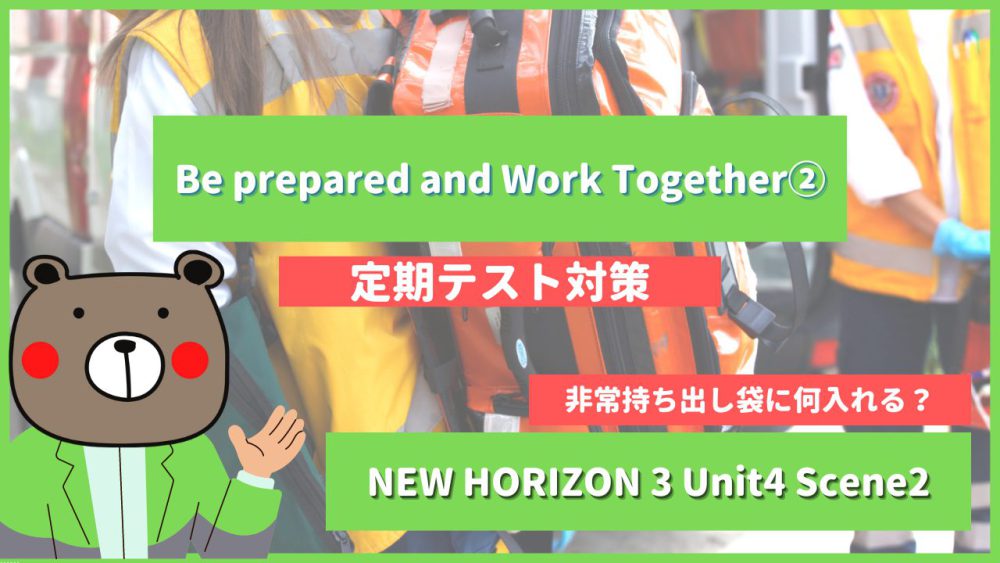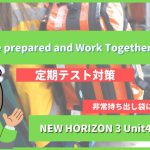▼動画で見たい方はこちらへ🐻

▼NEW HORIZON-中3《Unit4》はこちらから🐻
- 授業前にひとこと
- 勉強のポイント
- 本文&和訳
- 重要単語
- 重要ポイント
- 【1】What kinds of troubles did these people have?
- 【2】When the earthquake began, I didn’t know what was happening.
- 【3】After the terrible shaking, I ran out of the house with my wife.
- 【4】We didn’t know where to go , so we drove to a supermarket parking lot.
- 【5】We stayed in our car for five hours.
- 【6】We were too scared to get out.
- 【7】Finally, we spoke to a police officer passing by.
- 【8】He guided us to the local shelter.
- 【9】I didn’t know about it until then.
- 【10】My friend and I took a day trip by train.
- 【11】On the way back, there was a big earthquake.
- 【12】Trains stopped running.
- 【13】The announcements at the station were in Japanese.
- 【14】We looked on the internet, but all the latest information there was in Japanese, too.
- 【15】Fortunately, there was a woman speaking to some travelers in English.
- 【16】She told us how to go back.
- 【17】We spoke to a police officer passing by.
授業前にひとこと


今回も、NEW HORIZON-中3《Unit4》について扱っていきます❗️
Unit4のタイトルは…🐻
Be prepared and Work Together
という「防災の取り組みについて」のお話です。
ちなみに、このUnitでメインで使われている文法事項は…
間接疑問文・現在分詞・過去分詞
です❗️
さて、いつも授業前に説明することですが…
⇧に載せてあります『単語・和訳・英作文トレーニング』をテスト1週間前から毎日やってみてください❗️曖昧な理解がなくなり、成績が爆伸びします!!
勉強のポイント
①本文は、日本で地震にあった外国人の体験談であることを理解する。
②単語・重要ポイントをインプットする。
③現在分詞の後置修飾(後ろから名詞を説明)について理解する。
本文&和訳
テーマ
What kinds of troubles did these people have?
これらの人々はどんな種類のトラブルがありましたか?
本文(Case1:日本在住のバングラデシュ人男性)
When the earthquake began, I didn’t know what was happening.
地震が始まったとき、私は何が起こっているか分かりませんでした。
After the terrible shaking, I ran out of the house with my wife.
ひどい揺れの後、私は妻と一緒に家の外に走り出ました。
We didn’t know where to go , so we drove to a supermarket parking lot.
私たちはどこへ行くべきか分からなかった、だから私たちはスーパーの駐車場へ運転しました。
We stayed in our car for five hours.
私たちは5時間車の中にいました。
We were too scared to get out.
私たちはとても怖くて、外に出れませんでした。
Finally, we spoke to a police officer passing by.
ついに、私たちは通過している(通りかかった)警官に話しかけました。
He guided us to the local shelter.
彼は私たちを地域の避難所へ案内してくれました。
I didn’t know about it until then.
私はその時までそれについて知りませんでした。
本文(Case2:旅行中だったフランス人女性)
My friend and I took a day trip by train.
私と友達は電車で日帰り旅行をしてました。
On the way back, there was a big earthquake.
帰り道の途中で、大きな地震がありました。
Trains stopped running.
電車は走るの止めました。
The announcements at the station were in Japanese.
駅のアナウンスは日本語でした。
We looked on the internet, but all the latest information there was in Japanese, too.
私たちはインターネットを見ましたが、そこの全ての最新の情報も日本語でした。
Fortunately, there was a woman speaking to some travelers in English.
幸運なことに、英語で何人かの旅行者に話しかけている女性がいました。
She told us how to go back.
彼女は私たちにどのように帰るか(帰り方)を教えてくれました。
Key Sentence
We spoke to a police officer passing by.
私たちは通り過ぎている(通りかかった)警察に話しかけました
重要単語


V : 動詞 , Ving : 動名詞 , Vpp : 過去分詞, O:目的語, C:補語
| earthquake | 地震 |
| terrible | ひどい |
| shaking | 揺れ |
| drove | 「drive(運転する)」の過去形。drive《現在》 – drove《過去》 – driven《過去分詞》 |
| parking lot | 駐車場 |
| scared | 怖い |
| finally | ついに、最終的に |
| announcement(s) | アナウンス、発表 |
| latest | 最新の |
| fortunately | 幸運なことに |
| traveler(s) | 旅行者 |
| too … to ~ | とても…なので、~できない |
| get out | 外に出る |
| pass by | 通る、通過する |
| on the way back | 帰る途中に |
| go back | 帰る、戻る |
重要ポイント


「ピンク」=重要ポイント
▼記号について
V : 動詞 Ving : 動名詞 Vpp : 過去分詞
【 】名詞句・節 〈 〉形容詞句・節 ( )副詞句・節
S:主語 O:目的語 C:補語 M:副詞
【1】What kinds of troubles did these people have?
《和訳》
これらの人々はどんな種類のトラブルがありましたか?
《重要ポイント》
「What kinds of troubles ~」= どんな種類のトラブルが〜ですか?
・「what kinds of ~」= どんな種類の〜
・「kind」= 種類
*形容詞「親切な」という意味の「kind」ではないため注意❗️
【2】When the earthquake began, I didn’t know what was happening.
《和訳》
地震が始まったとき、私は何が起こっているか分かりませんでした。
《重要ポイント》
「When the earthquake began」= 地震が始まったとき
・「when + S(主語) + V(動詞)」= 「SがVするとき」 / 接続詞のwhen。
・「earthquake」= 地震
・「began」= 「begin(始まる)」の過去形
「I didn’t know what was happening」= 私は何が起こっているか分からなかった
・これは前回の最重要ポイント❗️
・Unit4-2に出てきた間接疑問文「疑問詞 + S(主語) + V(動詞)」の…
・疑問詞が「what(何を? / 何が?)」パターンです。
・間接疑問文についてはUnit4-1の最重要ポイントでしたね❗️
・疑問詞 = what, S = what(何が), V = was happening となっています。
*疑問詞「what」が主語の役割もしているパターンです🐻
・「何が起こっているか」が「know」の目的語になっていますね。
【3】After the terrible shaking, I ran out of the house with my wife.
《和訳》
ひどい揺れの後、私は妻と一緒に家の外に走り出ました。
《重要ポイント》
「After the terrible shaking」= ひどい揺れの後
・「after ~」= ~の後
・「terrible」= ひどい
・「shaking」= 揺れ、揺れること
「I ran out of the house with my wife」= 私は妻と一緒に家の外に走り出ました。
・「ran」= 「run(走る)」の過去形
・「out of ~」= ~の外へ、〜から出て
・「with ~」= ~と一緒に。
・「wife」= 妻
【4】We didn’t know where to go , so we drove to a supermarket parking lot.
《和訳》
私たちはどこへ行くべきか分からなかった、だから私たちはスーパーの駐車場へ運転しました。
《重要ポイント》
「We didn’t know where to go」= 私たちはどこへ行くべきか分からなかった
・これもUnit4の最重要ポイントの派生パターン❗️
・「疑問詞 + to V(動詞の原形)」です。
・Unit4-1でもすでに出てきた内容ですね🐻
・「疑問詞の意味(何を、いつ、どこで)+ Vすべき」と訳します!
・この文では、疑問詞 = where(どこへ), V = go となっています。
・「どこへ行くべきか」が「know」の目的語になっています❗️
「, so we drove to a supermarket parking lot.」= , だから私たちはスーパーの駐車場へ運転しました。
・「so ~」= だから ~
・「drove」= 「drive(運転する、車で行く)」の過去形
・「supermarket」= スーパー、スーパーマーケット。
・「parking lot」= 駐車場
【5】We stayed in our car for five hours.
《和訳》
私たちは5時間車の中にいました。
《重要ポイント》
「We stayed in our car」= 私たちは車の中にいました
・「stayed」= 「stay(いる、滞在する)」の過去形
・「in」= 〜の中に、という意味の前置詞。
【6】We were too scared to get out.
《和訳》
私たちはとても怖くて、外に出れませんでした。
《重要ポイント》
「too ~ to V(動詞の原形)」= とても〜なので、Vできない
・今回だと、~ = scared(怖い), V = get out(外に出る)
「scared」= 怖い
「get out」= 外に出る
【7】Finally, we spoke to a police officer passing by.
《和訳》
ついに、私たちは通過している(通りかかった)警官に話しかけました。
《重要ポイント》
「finally」= ついに、最終的に
「we spoke to a police officer passing by」= 私たちは通っている(通りかかった)警官に話しかけました
・これは今回の最重要ポイント❗️
・「現在分詞(動詞の~ing形)」です。
・すぐ前の《名詞》を後ろから修飾して「〜している《名詞》」
・つまり「《名詞》+ Ving(動詞のing形)」という形です❗️
・この文では、《名詞》= a police officer, Ving = passing by となっています。
・「通っている」が「警官」を修飾しています!
「speak to ~」 = ~に話しかける
「police officer」 = 警官
「pass by」 = 通る、通過する、通り過ぎる
【8】He guided us to the local shelter.
《和訳》
彼は私たちを地域の避難所へ案内してくれました。
《重要ポイント》
「He guided us to ~」 = 彼は私たちを〜へ案内した
・「guide」= 案内する
・「guide A to ~」= Aを〜に案内する
「the local shelter」 = 地域の避難所
・「local」= 地域の
・「shelter」= 避難所
・これはUnit4-1にも出てきましたね❗️
【9】I didn’t know about it until then.
《和訳》
私はその時までそれについて知りませんでした。
《重要ポイント》
「about ~」 = ~について
「until then」= そのときまで
・「until」= ~まで
・「then」= そのとき
【10】My friend and I took a day trip by train.
《和訳》
私と友達は電車で日帰り旅行をしてました。
《重要ポイント》
「took a day trip by train」= 電車で日帰り旅行をしました。
・「took」= 「take(〜を取る)」の過去形
・「take a trip」= 旅行をする
・「a day trip」= 日帰り旅行
・「by ~」= ~で。手段を表す前置詞。
【11】On the way back, there was a big earthquake.
《和訳》
帰り道の途中で、大きな地震がありました。
《重要ポイント》
「On the way back」= 帰り道の途中で
・「on the way ~」= ~の途中で
「there was a big earthquake」= 大きな地震があった
・「there is / are ~」= ~がある
・「earthquake」= 地震
【12】Trains stopped running.
《和訳》
電車は走るの止めました。
《重要ポイント》
「stop Ving(動詞のing形)」= Vすることを止める
・これは、動名詞ですね❗️
・今回は、Ving = running(走ること)
・先ほど出てきた「現在分詞」も《動詞のing形》で形は一緒だけど…
・動名詞 = 名詞の働き、現在分詞 = 形容詞の働き、です🐻
【13】The announcements at the station were in Japanese.
《和訳》
駅のアナウンスは日本語でした。
《重要ポイント》
「announcement」= アナウンス、発表
【14】We looked on the internet, but all the latest information there was in Japanese, too.
《和訳》
私たちはインターネットを見ましたが、そこの全ての最新の情報も日本語でした。
《重要ポイント》
「We looked on the internet」= 私たちはインターネットを見ました
・「look on ~」= ~を見る、考える
「all the latest information there was in Japanese, too」= そこの全ての最新の情報も日本語でした
・「all ~」= 全ての〜
・「the latest」= 最新の
*ちなみに「latest(最新の)」は「late(遅い ⇨ 新しい)」の最上級
・「there」= そこの
【15】Fortunately, there was a woman speaking to some travelers in English.
《和訳》
幸運なことに、英語で何人かの旅行者に話しかけている女性がいました。
《重要ポイント》
「Fortunately, 」= 幸運なことに
「there was a woman speaking to ~」= ~に話しかけている女性がいました。
・これも先ほど出てきた、今回の最重要ポイント❗️
・「現在分詞(動詞の~ing形)」です。
・すぐ前の《名詞》を後ろから修飾して「〜している《名詞》」
・つまり「《名詞》+ Ving(動詞のing形)」という形です❗️
・この文では、《名詞》= a woman, Ving = speaking to ~ となっています。
・「〜に話しかけている」が「女性」を修飾しています!
「there was a woman」= 女性がいました
・「there is / are ~」= ~がいる、ある
・「woman」= 女性
「speak to ~」= ~に話しかける
「some travelers」= 何人かの旅行者
・「some ~」= いくつかの / 何人かの〜
・「traveler」= 旅行者
【16】She told us how to go back.
《和訳》
彼女は私たちにどのように帰るか(帰り方)を教えてくれました。
《重要ポイント》
「She told us how to go back」= 彼女は私たちにどのように帰るか(帰り方)を教えてくれました。
・これ文章は短いですが…
・重要ポイント二つあります❗️
「tell A B」= AにBを言う / 教える
・まず一つ目❗️「tell」の用法です!
(「told」= 「tell(言う, 話す, 教える)」の過去形)
・今回だと、A = us, B = how to go back(どのように帰るか)
・Aには人、Bには物や情報が入ることが多いです!
*ちなみに、これは高校だと第4文型としてもっと詳しく習います🐻
「how to go back」= どのように帰るか(帰り方)
・二つ目❗️「how + to V」です!!
・これは、何度か出てきたUnit4の最重要ポイントの派生パターン❗️
・「疑問詞 + to V(動詞の原形)」です。
・Unit4-1でもすでに出てきた内容ですね🐻
・「疑問詞の意味(何を、いつ、どこで)+ Vすべき」と訳します!
・この文では、疑問詞 = how(どのように), V = go back となっています。
・「どのように戻るべきか」が「told」の目的語になっています❗️
【17】We spoke to a police officer passing by.
《和訳》
私たちは通り過ぎている(通りかかった)警察に話しかけました
《重要ポイント》
これは先ほど出てきた最重要ポイントですね❗️
「現在分詞(動詞の~ing形)」をしっかり復習しましょう!!!


これで全て終了です❗️
「NEW HORIZON-中3《Unit4-Read and Think1》」おつかれさまでした🐻
単語のレベルも高く、現在分詞(動詞の~ing形)、whatの間接疑問文、how + to V(動詞の原形)、第4文型が出てきたりと、なかなか苦戦した方も多いと思います❗️
ぜひ復習&音読するのをお忘れなく!!
①授業前にひとこと、でも話しましたが…
⇧に載せてあります『単語・和訳・英作文トレーニング』をテスト1週間前から毎日やってみてください❗️曖昧な理解がなくなり、成績が爆伸びします!!
最後まで見てくださってありがとうございました!
またお会いしましょう!定期テストがんばれ〜🐻
じゃあね〜、バイバイ!!













